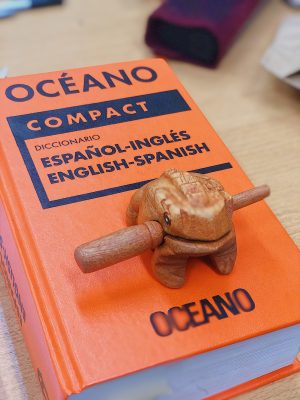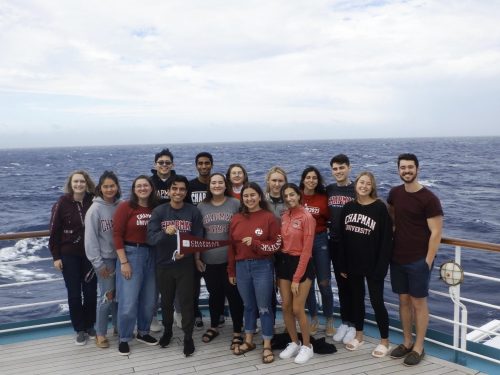Increase Your Intercultural Fluency During COVID 12 practical ways to increase this researched "career readiness" competency
November 13, 2020
Intercultural fluency is the knowledge of and communication between people from different cultures. The National Association for Colleges and Employers (NACE) has defined “career readiness” competencies that employers value, including intercultural fluency, because they prepare college graduates for a successful transition into the workplace. Global education experiences, including semesters abroad, faculty-led Travel Courses, and international internships, are associated with many of NACE’s competencies. Although the COVID-19 pandemic has paused international travel, it has not stopped the growth of global competence through other mediums. Read on to discover a dozen practical strategies to increase intercultural fluency while studying from home:
1. Read Local News from Abroad
Reading the local newspaper from wherever students intend to study abroad keeps them abreast of current events in their host destination. Students can perform a Google search in a target language about a recent event to find local news outlets. For linguistic development, it is best to read in the local language. Nevertheless, many newspaper websites will offer English translations, or browsers could translate a document instantly. Translations are helpful if students are beginning to learn the language and for double-checking one’s understanding after reading the article in the local language. While finding outlets in a target language is helpful, just the act of reading news that is not from a U.S. perspective, even in English, will improve students‘ ability to analyze the information they are given for bias, learn current events from around the world, and decolonize their news. Beyond the linguistic benefit, reading local news enables students to develop their analyzation skills by comparing the type of coverage of the same event across multiple sources and compare, for example, different government and community reactions to COVID across numerous countries. Furthermore, staying abreast of local current events will provide students with points of conversation when speaking with locals and may divulge aspects of the culture to which students had not previously exposed themselves.

2. Read Books in Another Language or Translated Books
Anyone that prefers books over news can learn about contemporary attitudes and local issues by reading what is currently being released and is popular in other countries. Leatherby Libraries has options. Additionally, students can check their local libraries for options; local libraries often have partnerships with apps like Libby and Hoopla that allow members to borrow ebooks and audiobooks from their library for free straight from their phone. Students can find these points of connection wherever they already are and whatever interests they already have. If you love a good fantasy, SciFi, or contemporary novel, there are probably tons of non-US authors writing wonderful books in your favorite genres. November is Native American heritage month, and there are plenty of recommendations of indigenous and first nations authors going around right now. One way to get started is by conducting a bookshelf audit – consider the diversity of authors on your bookshelf – how many are from the same/your race? LGBT+ identity? national origin? background? ability? gender? Filling in the gaps on your bookshelf can provide you with diverse perspectives and thus increase your intercultural fluency.
3. Research the Host Destination
Reading local newspapers is optimal for keeping up with current events, but it is equally essential to be aware of one’s host country’s historical events and contemporary attitudes. While Scholarpedia is convenient for a glance, it is recommended to research using scholarly databases. Chapman students have free access to all Leatherby Libraries databases and dedicated staff who help students do thorough and comprehensive research. Their search tool can be filtered by subject area to hone down what students are looking for easily. We also recommend familiarizing oneself with countries’ social attitudes. Diversity Abroad offers free and brief “Destination Guides” that synthesize both governmental and social perspectives. Take a snippet from their synopsis of the current status of diversity and inclusion in France, for example:
“While France is generally a liberal country with laws designed to protect marginalized populations from discrimination, not everyone shares these ideals. This information may cause concern, but it is important to note that the French public’s perceptions of immigrants are very similar to those of the U.S. public, with more than half of the respondents recognizing the strengths that immigrants bring to their new countries.”
4. Join International Facebook Groups
Social media provide mediums for people with mutual interests to connect regardless of location or culture. Platforms, such as Facebook Groups, allow students to find a community of people from different cultures without ever leaving their room. Furthermore, there may be Facebook Groups in one’s host destination that students can join from abroad. Connecting through such platforms creates an informal method of learning how their interests come alive abroad and allows students to befriend locals before arriving.

5. Streaming Services in Another Language (Audio or Subtitles)
Even if students do not plan on becoming fluent in another language, exposing one’s ears to the sound, tone, and slang of the local language will ease the linguistic transition abroad when international travel is once again permitted. Streaming services, such as Netflix and Amazon Prime Video, have shows and movies filmed in the target language, which students can watch with English subtitles. Alternatively, students can watch their favorite shows dubbed in the target language with English subtitles. Watching classic Disney movies on Disney+ is a great way to practice the language while rewatching a favorite. Beginners can watch shows in English with subtitles from the target language, while experts should aim to watch shows in the target language without any subtitles.
6. Netflix Popular Shows from Abroad (and Research Other Countries‘ Reactions to Popular Shows in the U.S.)
Entertainment can provide us a lens into popular culture both in the U.S. and abroad. Students can research the top shows on Netflix in Taiwan, Jordan, Chile, or elsewhere to see what locals are currently binging. Then, students can watch those shows either in English or the local language with or without subtitles. Watching the most-viewed series and movies abroad will give spectators an idea of what people in other cultures find exciting, funny, and overall entertaining, which varies from culture to culture.
 Likewise, other countries may have different popular opinions about shows that people in the U.S. find entertaining. For example, students that have watched “Emily in Paris“ recently could look up how Parisians reacted to the show. Students that have watched “Narcos“ or “Narcos: Mexico“ could research what Colombians and Mexicans thought about the series respectively. Students that love K-dramas can find reactions by Korean people on how realistic those shows are to life in Korea. Familiarizing oneself with others‘ perspectives can provide students with ideas that they may have previously overlooked.
Likewise, other countries may have different popular opinions about shows that people in the U.S. find entertaining. For example, students that have watched “Emily in Paris“ recently could look up how Parisians reacted to the show. Students that have watched “Narcos“ or “Narcos: Mexico“ could research what Colombians and Mexicans thought about the series respectively. Students that love K-dramas can find reactions by Korean people on how realistic those shows are to life in Korea. Familiarizing oneself with others‘ perspectives can provide students with ideas that they may have previously overlooked.
7. Follow YouTubers From Abroad
Local YouTubers are another source of insight into popular culture around the world. Local, native, or expats who now live in-country may provide viewers with a perspective on fashion, entertainment, sports, and other elements of culture. Watching international YouTubers is free and allows viewers to live and travel vicariously through them.
8. Blog in Another Language
In addition to facilitating reflection and processing experiences, blogging can also increase intercultural fluency. Students can practice by writing a paragraph in Mandarin, Swiss, Arabic, or another language that they plan to visit in the future. Furthermore, students can continue blogging once abroad and produce a memoir of their experience through which they can reminisce for years after the experience. 
Consider a free online platform that will never expire, such as WordPress. Blogging is a great way to articulate your growing understanding of other languages and cultures and enhance your intercultural fluency through deliberate reflection.
9. Language-learning Apps
Free language-learning apps, such as Mango Languages and Duolingo, allow students to learn a language through mini–lessons on their phones, tablets, or browsers. The lessons are short, interactive, and even allow students to compete with a friend. In fact, Chapman has a partnership with Mango Languages, which is more robust than Duolingo because it is a paid service that Chapman students have access to for free! There are lessons for amateurs and experts and everyone in between. Consider downloading a language-learning app for an instant and economical start to learning another language.
10. Chapman Clubs & Organizations
For students interested in putting their language learning to practice, Chapman has clubs and organizations that are internationally focused and offer students the opportunity to engage with peers from different cultures. There are language clubs as well as cultural clubs that welcome students of all backgrounds. Check out the “Academic and Professional” and the “Diversity and Cultural” clubs on the Chapman general club list. To search for clubs by keywords, students can log in to Engage.

11. Chapman Courses (Languages or Internationally focused)
Students can register for courses at Chapman that will expose them to international perspectives. Some may think language courses are the only internationally focused courses available when, in fact, there are courses that could count for a non-language major or minor that are internationally based. For example, business students can enroll in MKTG 406 International Marketing, which is an upper-division elective. Students can also enroll in a course in the Latinx and Latin American Studies minor, the new Africana Studies minor, the Ethnic Studies Themed Inquiry (Cluster), or for their Global Studies Inquiry general education requirement.

12. Become a Panther Pal
The Panther Pal Program is a buddy program that pairs up Chapman students with incoming exchange students. Becoming a Panther Pal offers students the opportunity to befriend and welcome an international student on campus and grow their own intercultural fluency domestically. Students can apply to become a fall 2021 Panther Pal in February 2021. Subscribe to the CGE monthly newsletter to know when applications open.
After building up your intercultural fluency at home and when travel opens up again, consider putting those skills to the test with a global education program.
Apply for a Summer 2021 International Internship (DEADLINE NOVEMBER 18)
International internships afford students all the benefits of an international experience with the extra dimension of professional development. They look great on resumes and provide alumni with concrete topics of discussion during interviews. Summer 2021 international internship applications are open, and the deadline is Wednesday, November 18, by 4 p.m. PST. For more information on the application process, visit the International Internship website. View Full Listing of Summer International Internship Programs.
Apply for a Fall 2021 Semester Abroad (DEADLINE DECEMBER 4)
Semesters abroad allow students to take a full semester load of courses at a foreign institution and live abroad for a semester. Applications for fall 2021 are now open. The deadline is Friday, December 4, 2020, at 11:59 p.m. PST. Students must attend a Global First Steps session before opening an application. View Full Listing of Academic Year/Semester Abroad Programs.
Apply for a Summer 2021 Travel Course (Deadline March 2021)
Travel Courses are short-term study abroad courses led by Chapman faculty. Summer 2021 Travel Course information will be available in late January 2021. For updates about our programs, go to Chapman.edu/travelcourses.
Developing one’s intercultural fluency is possible despite the pandemic. Employers will continue to value this competency regardless of the suspension of international travel. Get a leg up on your stationary peers by growing your intercultural fluency during COVID!
The Center for Global Education (CGE) hosts several blogs with expert advice and student testimonies. Read about alumni experiences and other study abroad tips on the CGE Blogs website. To hear when new blogs are posted, and to stay up to date with deadlines and events from the Center for Global Education, subscribe to the CGE monthly newsletter.



